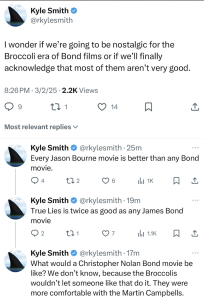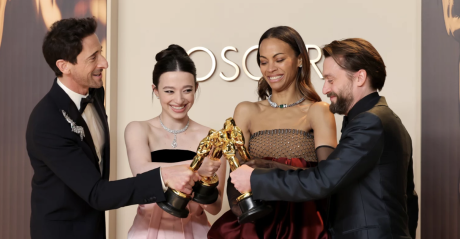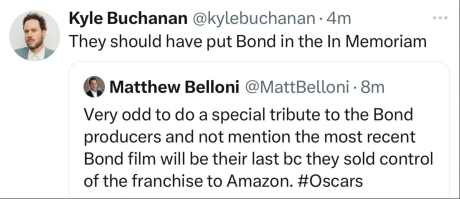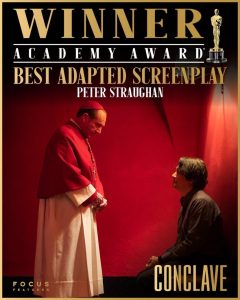A few hours ago Sasha Stone and I chewed it all over (i.e., last night’s Oscar telecast). We didn’t miss a trick.
Daily
Dude Has No Choice
If you’re married to or living with a good-looking woman of a certain age, every so often you need to mention the fact that she looks really great. If you want to stay out of trouble, that’s the only way to play it.
Even if she could use a little spritzing or smoothing out, never say that she might want to think about doing this.
Paulina Porizkova was a super-hot model in her youth and middle age, but now that she’s about to turn 60…well, what can a gentleman say except “you look exquisite”?
You can never be honest with a woman about the realities of aging.
Only an idiot would say to her “you look ravishing but…well, to be perfectly honest, you’d look even better if you touched up your eyelids and eye bags and eliminate that little hint of a neck wattle…you could lose 10 or 15 years in one fell swoop…hell, you’d be a total knockout”.
A woman can say this to another woman, but if a guy says it, forget it…he’s a dead man.
If a woman said to me “you had some work done back in 2012 or 13 years ago, right?…you might want to think about getting a little re-touch down the road,” I’d probably say “yeah, you’re probably right…facial work only lasts about 15 years or so, 20 at the outside.”



New Mexico Bureaucrat Says…
Friendo confidential: “A female friend knows the chief medical examiner in New Mexico. She said that Gene Hackman’s wife, 63-year-old Betsy Arakawa, died from an ailment that had nothing to do wth Hackman’s heart condition. Once she had passed the exceedingly frail Hackman was left helpless, and without his wife to assist him he wound up collapsing in the ‘mud room.’ One of the dogs that was in the kennel died because of no food or water. The other two dogs who weren’t in the kennel survived.”
HE response: Who lies down on a bathroom floor when they’re weakened by the flu or whatever? 63 year-old women don’t just keel over and die on the bathroom floor. If you’re feeing badly you call a nurse or an ambulance service. Arakawa was a responsible person. Why would she allow herself to drift off without calling someone to assist her husband?
Alain Delon Snubbed in Oscar Death Reel!
Alain Delon, who passed last August, was a huge French megastar in the ‘60s and ’70s. In Europe he was on the level of Robert Redford, James Dean, Marlon Brando, Paul Newman, Humphrey Bogart, etc. But he was left out of last night’s Death Reel because he became an immigrant-loathing right-winger in his declining years. I didn’t agree with his political views either, but for God’s sake, you don’t ignore the passing of Alain Delon….c’mon! If he hadn’t become a rightie they would have honored the poor guy.
Out of 25, Five or Six Good Bonds
Most of the 25 James Bond films have more or less blown chunks. Dr. No and From Russia With Love are more or less perfect. Casino Royale, Skyfall, No Time To die, For Your Eyes Only…maybe one or two others are pretty good with reservations.
I’m not lamenting the death of the Bond signature films, which pale alongside the Mission: Impossible films. I’m sorry that the Bond franchise will henceforth become milked for Amazon streaming opportunities….that’s the difference.

“That’s The Performance!”
@goodtimemedia The moment #MikeyMadison shocked #TheOscars ♬ original sound – GoodTime
@.kwabbie Five Oscar wins is insane! Again it’s important to make independent films because it’s tells stories that people need to hear. I know people are gonna say Wicked was snub but idk.. i think they got the awards they deserved. Anora was a pleasant surprise tho #anora #oscars #oscars2025 #independentfilm ♬ original sound – Kwabbie
Because he couldn’t stop saying “uhmm” over and over, I was unable to listen to what this guy was saying about Demi Moore vs. Mikey Madison. I hate people say “uhmm” over and over and over. Go to a psychotherapist or go to an exorcist but cure yourself of this heinous disease.
@mapchat Watched Anora last night and can definitely see why Mikey Madison won (she spent 3 months in Brooklyn shadowing her character’s life to get it down). I also would have loved if Demi would have won. What are your thoughts? #oscars ♬ original sound – Mapchat
Brody Aside, Good Guys Won In The End
Just think of all the tens of millions of complacent, asleep-at-the-wheel moviegoers who said to each other last night, “Wow…Anora, huh? We couldn’t be bothered to see it late last year when it opened theatrically” — HE attended a weekend showing when Anora opened in Westport, and there were maybe eight or nine people in the room, if that — “and we haven’t bothered to stream it since but maybe we should stream it now, huh? Yeah, maybe we should…maybe. If nothing better is on.”
You lazy, spiritually flabby, heavy-lidded, under-educated, dead-to-the-world sloths…Anora‘s creator pleaded with the movie-loving community to support theatres, and this message went unheeded by the masses, trust me…into one wax-filled ear and right out the other. You effing toads…you guys are the sworn enemies of great, spirit-lifting cinema…you are the empty, overfed animals watching alligators eating fair young Christian maidens in Cecil B. DeMille‘s The Sign of the Cross (’32).
Anora won five Oscars last night, and all the stupid, stubborn HE beeyotches and wrong-way-Corrigans who constantly shat and peed upon this wonderful film (including “It Ain’t Heavy, I’m An Asshole“) are eating a semblance of humble pie this morning and yet they’re still calling Baker’s film unworthy to a certain extent.
Life is wasted on people but not on me for I am the light and “the way”…HE knew and cared deeply all along….I only support the best of the tip-tops…the most heart-massaging, the most cinematically pure…and to this day I stand tall and alone against the over-praised Bong Joon-ho for Okja and especially for that idiotic scene when the drunken con artist mom let the maid into the home during that rainstorm.
Before last night no filmmaker had won four Oscars for making the same film, but Anora‘s Sean Baker did this, you bet — a Best Picture Oscar for producing, plus Oscars for directing, original screenplay and editing…boomsheewackle!

Mikey Madison‘s surprise Best Actress win blew me backward and up, up and away….whoa! I’d been pushing and predicting this for months on end, and yet I “knew” and feared deep down that the bullshit Demi Moore narrative (“Those big bad producers, agents and managers wouldn’t let me make a substantial movie all those years…they forced me to star in high-paying popcorn movies and I suffered so much because of this but now I’m free…the Substance actress I’ve always wanted to be!”) had taken hold among so many SAGsters and that so many prognosticators and award-season pulse-takers (Pete Hammond, Anne Thompson) were on Demi’s side.
And yet HE’s “don’t buy into the Demi horseshit” argument, which I posted and re-posted two or three times, won the day in the end! Okay, that plus the undebatable fact that a huge congregation of Academy voters simply loved Mikey’s performance.
Adrien Brody‘s tedious, tiresome, drawn-out acceptance speech was a reflection of or a companion piece to his unbearably morose, heroin-shooting lead performance in The Brutalist…the mass audience was saying to Brody “we’re so sorry that you won…you’re such a drag…we hate your ass…get off the damn stage!”
Brody: “Thank you, God…thank you for this blessed life…for this tremendous outpouring of love…I feel so fortunate…I have some perspective [upon coming back here after winning the Best Actor Oscar for The Pianist in ’02 and landing almost nothing but shit roles in the aftermath]….it can all go away. Winning an award like this signifies a destination…it is a chance to begin again, and the opportunity hopefully to be fortunate enough over the next 20 years of my life [to land better roles than I managed to land after I won for The Pianist over two decades ago]…I will wrap up, I will wrap up…please, this is not my first rodeo….[we are reminded] not to let hate go unchecked…okay, I’ll get out of here.”
All hail Conan O’Brien for his “standing up to a powerful Russian” joke [see below].
HE’s Official “Stop Adrien Brody” Oscar Live Bloggy-Blog
10:38 pm: Mikey Madison wins the Best Actress Oscar!!! Demi Moore and her dishonest narrative have been defeated!!! Eureka!!
The HE server is stalling due to a traffic surge…apoligies
10:18 pm: Cillian Murphy strolls out to give the Best Actor Oscar to fucking Adrien Brody. I’m sick, depressed, pissed off, scowling. Timothee Chalamet, Ralph Fiennes or Sebastian Stan…awarding any of these performances would have been far more suitable. Brody has been going on and on and on….you should know what a drag it is to listen to you, man. Will you shut up? Pretentiousness…wow.
10:10 pm: The Brutalist wins for Best Score? Why? I don’t remmember a single note, a single stanza, a single measure…no musically enticing moments of any kind from that difficult-to-endure film.
10:08 pm: Conan O’Brien‘s best line of the night: “Anora having a good night so far,,,yeah, I guess people are pleased to finally see someone stand up to a powerful Russian.”
9:57 pm: HE fully approves of Walter Salles‘ I’m Still Here winning the Best Int’l Feature Oscar. Fully deserved. Proud moment all around.
9;54 pm: The fucking Brutalist wins for best Cinematography? Why? Because it was shot in VistaVision? The lensing is dreary, glum, morose. Very strange call.
9:40 pm: Morgan Freemqn offering a special tribute to the late Gene Hackman. “Rest in peace, my friend.” Freeman doesn’t look like himself these days. Hackman was given the cleanup finale position in the death reel. David lynch, Robert Towne, James Earl Jones. Who was snubbed?
9:36 pm: Dune Part II wins for Best Sound, Best Visual Effects….blah.
9:15 pm: Best Documentary Feature Oscar goes to No Other Land, which I’ve barely heard of and certainly haven’t seen. Pro-Gaza, of course. Yes, I intend to see it. Stop supporting terror!
8:57 pm: Mick Jagger strolls on stage! Best Original Song. Obviously Bob Dylan‘s songs were the best ones performed in a 2024 film. The Oscar goes to the Emilia Perez song, “El Mal.” Congrats!
8:55 pm: Wicked guys win best Production Design Oscar. Congrats,….nobody cares.
8:46 pm: Zoe Saldana has known for many weeks that she’s winning the Best Supporting Actress Oscar so stop with the fucking crying already. Suck it in, show a little class….stop it! Take the bow, you won, great, congrats, etc. But enough with the identity crap (“the first Dominican woman to win this award!)
8:42 pm: Anora‘s Sean Baker wins Best Editing Oscar! Amazing! He’ll almost certainly win Best Director and w eqall know Anora is locked for Best Picture Oscar…four for Sean!
8:31 pm: The integrity of the Bond franchise is over, Amazon has bought out Barbara Broccoli and Michael Wilson and will proceed to franchise and stream it do death, and so the Oscars are mounting a big Vegas-y musical-slash-dance-ass tribute to the Bond films. This whole big sequence is basically a huge fuck-you to Amazon in general and Jennifer Salke in particular.

8:23 pm: Substance wins the Best Makeup Oscar…okay, that’s fair.

8:13 pm: Conclave‘s Peter Straughn wins Best Adapted Screenplay!
8:10 pm: Sean Baker wins Best Original Screenplay for Anora! This is a forecast of things to come, methinks.
8:08 pm: Nick Offerman (whom I never, ever want to see in a gay sex scene EVER AGAIN) does a voice-over harassment skit with Conan.
7:53 pm: Costume design! Which will go to either the Dune, Conclave or Wicked guys, right? And the Oscar goes to Team Wicked. Paul Tazewell! First black dude to win for costume design….racial barrier falls!
7:28 pm: You promised you’d be quick, Andrew Garfield….you lied. I hate corporate-funded, broadly ufunny, family-friendly animation. The dialogue-free Flow wins Best Animated Feature…whatever. Cheers. Congrats also to Latvia’s In The Shadow of the Cypress.
real shit https://t.co/qXD8DxzuBM pic.twitter.com/ldcebyPA3c
— zoë rose bryant (@zoerosebryant) March 3, 2025
7:28 pm: Robert Downey, Jr‘s flared tuxedo pants don’t make it. Shout-out to Anora‘s Yura Borisov! Jeremy Strong‘s performance as Roy Cohn was “a master class.” (Strong should have won,) The universally predicted win for Kieran Culkin has happened, of course. Culkin is jabbering jabbering jabbering…really cutting loose.
7:04 pm: HE dislikes watching Wicked‘s two wailing, warbling costars (Cynthia Erivo, Ariana Grande) over-singing the fuck out out of those wailing, over-emphatic songs….I already have a headache and the show just started…God!
And now a Substance body-horror, Conan-emerging-from-Demi’s-body joke…”did Conan not have work done?….Hollywood’s biggest night starts at 4 pm…18 Netflix price increases!…I really loved The Butalist…I didn’t want it to end, and luckily it didn’t.” Hollywood hates, hates, HATES The Brutalist….joke about Karla Sofia Gascon‘s publicist using the “f” word 482 times. Adam Sandler poorly dressed routine was moderately funny.
HE’s Live Oscar Blog Will Initially Be Half-Assed
…for the first half-hour of the show, give or take. I’m picking up a client at LGA at 6 pm and delivering them to Stamford (short trip), so I probably won’t be plopped in front of the 65″ Sony 4K HBR in Wilton until 7:30 pm, depending on the breaks. I will, however, be following the first 30 minutes of the show on the Hulu headphones.
Carte Blanche?
Accurate or what? pic.twitter.com/j7ZeRSlv4z
— Community Notes & Violations (@CNviolations) March 1, 2025
Imagine Being So Banal in Your Soul
…that you’d decide to re-watch Steven Spielberg‘s War Horse on Hulu Plus…imagine!
Posted on 1.9.12: “My own oft-repeated view is fact that anyone with a smidgen of taste or perspective knew from the get-go that Spielberg’s film didn’t have the internals that would make it go all the way, and that the only thing it had going for it was the fact that many respectable professionals (including IndieWire columnist Anne Thompson and Fox publicity honcho Bumble Ward) admitted it had made them cry.
“I have an odd theory. I could be off-base, but I believe that a particular line of dialogue did a lot to stop War Horse. That’s right — one line.
“It was spoken during the no-man’s-land, barbed-wire scene when the British and the German soldier are cutting through the wire that has totally entangled poor Joey. And they start talking about this and that, and the British soldier says (I’m paraphrasing from memory), “You know, here we are…soldiers from opposing sides, standing in a muddy no-man’s-land at night and helping this poor beast get free of the wire. Heh…you know something? I think we should give him a name. But what could we reasonably call him, given that he’s a horse and we’re in the middle of a war? Wait…I know! I think we could call him ‘war horse.’ It kinda fits, you know?”
“I was already slumping in my seat when that scene began. But after the British soldier said it I muttered to myself, “Holey moley! All right, that’s it…no way this thing wins the Best Picture Oscar. In fact, it may not even be nominated.”
Russki Oscar Openers
From Oscar prognostiactor and East Hamptons quipster Bill McCuddy…
Conan joke #1. “Anora is about someone completely taken in by a waste-of-skin Russian who has no intention of living up to his promises, much less behaving like a man of honor in any capacity. President Trump saw it and said ‘See, that’s what’s wrong with Hollywood…that could never happen.'”
Conan joke #2. “Sylvester Stallone, Jean Claude Van Damme and Mr. Miyagi have agreed to train Zelensky for his rematch with Trump.”
